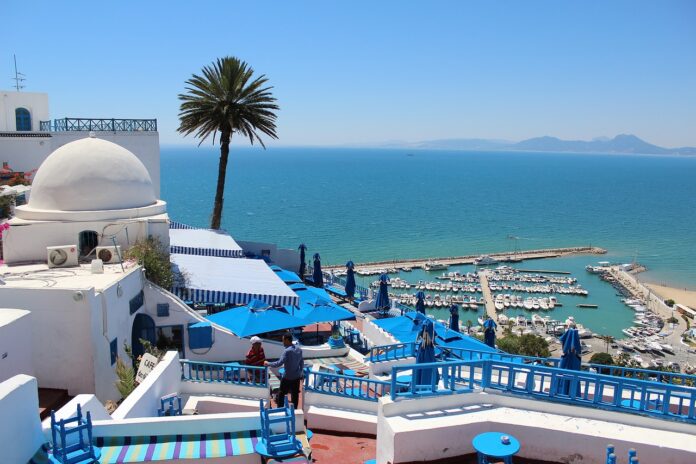Tunisia has long been a popular tourist destination, including for Russian travelers. With its warm Mediterranean coast, affordable prices, and cozy hotels that rival European standards, Tunisia offers an ideal setting for a pleasant vacation. As a result, Tunisian resorts have successfully competed with those in Turkey and Egypt for many years.
Facts About Tunisia:
- Economic Stability: Along with other North African countries like Algeria, Morocco, and Egypt, Tunisia is one of the most developed and economically stable nations on the African continent.
- Population: Tunisia has a population of about 11 million people, which is a couple of million less than the population of Moscow alone.
- Languages: French is an official language alongside Arabic, but in practice, few people speak it fluently.
- Prestigious Professions: Teaching and medicine are the most prestigious professions in Tunisia. The government once spent half of its budget on healthcare and education, resulting in the elimination of illiteracy and the construction of beautiful schools and hospitals, with Tunisian medical facilities being renowned worldwide.
- Historical Cities: Modern Tunisian cities are built on the territory of the former Phoenician state, with Carthage being its powerful center. The ruins of Carthage still exist today.
- Capital City: The capital, the capital region (known as a “wilaya”), and the country itself all share the same name—Tunisia.
- Ottoman Influence: Tunisia was conquered three times by the Ottoman Empire, but the Turks never managed to establish firm control over the country.
- Working Hours: During the summer, most Tunisians start their workday between 5:00 and 7:00 a.m. and finish before noon due to the unbearable afternoon heat.
- Date Palms: Tunisia exclusively grows date palms, with the most popular variety called “Fingers of Light.” However, most of the harvest is exported, making it difficult to buy dates locally.
- Star Wars Connection: Scenes set on the planet Tatooine in “Star Wars,” where Luke Skywalker spent his childhood, were filmed in Tunisia.
- Beards and Mustaches: Local men only grow beards if they also have mustaches. Foreigners who don’t follow this custom may receive disapproving looks.
- Smallest Country in North Africa: Tunisia is the smallest country in North Africa by area, ranking 91st among the world’s largest countries.
- Ancient Trees: Tunisia is home to many ancient trees, including an olive tree that is over 2,400 years old.
- Feminine Name: The name “Tunisia” is actually feminine, and there’s even a woman’s name “Tunis.”
- Camels: Tunisians believe that camels, which are widespread in the country, consider people not as masters but as friends.
- Dromedaries: All camels in Tunisia are dromedaries, meaning they have only one hump. There are no two-humped camels (Bactrians) in the country.
- “Kis-Kis”: The word “Kis-Kis,” used by Europeans to call cats, is used in Tunisia to shoo them away.
- Jellyfish Sting Remedy: Tunisians have developed their own remedy for jellyfish stings, which are common in coastal waters. Rubbing the affected area with sand and applying a slice of tomato is the local treatment.
- Cactus Hedges: Cacti are very common in Tunisia, and the most popular living fence is made from cactus plants. They are beautiful and nearly impossible to penetrate due to their sharp thorns.
- Flat Roofs: All houses in Tunisia have flat roofs since there is no snow, and this design helps keep the houses cooler.
- Fragrant Evenings: After sunset in Tunisia, you may notice a unique and pleasant fragrance in the air. This is from the fel, a flower that is widespread in the country and starts to release its scent after dark.
- Police Regulations: Tunisian police are not allowed to stop a car for a traffic violation if the driver is a woman.
- Sahara Rose: A unique attraction in Tunisia is the “Rose of the Sahara,” a “flower” formed from salt and sand in the desert. These crystals, which can reach up to 3 meters in height, are often used to decorate aquariums and homes.
- Tunisian Colosseum: Tunisia has its own “Colosseum,” built during the Roman Empire. Its proper name is the “Roman Amphitheater of Thysdrus” in the city of El Jem.
- Local Spirit: The local spirit called “boukha” is made from figs.
- Life Expectancy: The average life expectancy in Tunisia is over ten years longer than in Russia.
- Proximity to Italy: The distance from Tunisia to Italy across the Mediterranean Sea is less than 160 km, making it possible to cross by ferry relatively quickly.
- Sidi Bou Said: In the Tunisian city of Sidi Bou Said, all houses are painted white and blue, and repainting them is legally prohibited to preserve the town’s historical appearance.
- Harissa: The cornerstone of Tunisian cuisine is a spicy paste called harissa, made from olive oil and red pepper. It is served with almost every dish except desserts.
- Football: Football is the most popular sport in Tunisia. During major broadcasts, the entire population gathers in front of their TVs.
